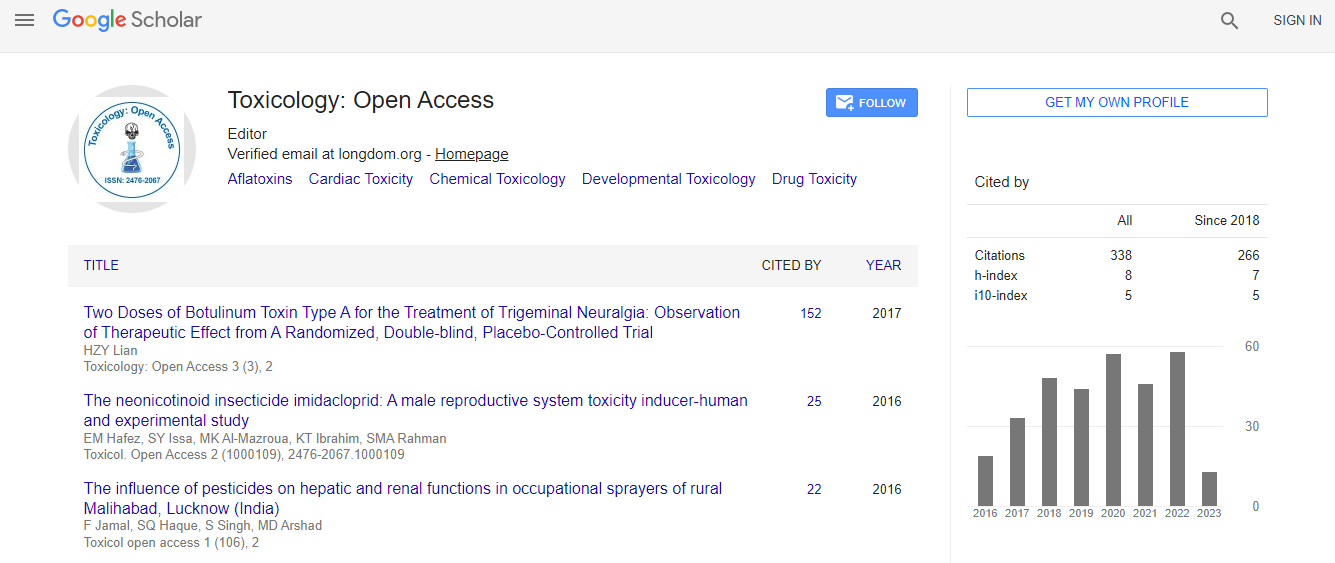Our Group organises 3000+ Global Conferenceseries Events every year across USA, Europe & Asia with support from 1000 more scientific Societies and Publishes 700+ Open Access Journals which contains over 50000 eminent personalities, reputed scientists as editorial board members.
Open Access Journals gaining more Readers and Citations
700 Journals and 15,000,000 Readers Each Journal is getting 25,000+ Readers
Google Scholar citation report
Citations : 336
Toxicology: Open Access received 336 citations as per Google Scholar report
Indexed In
- Google Scholar
- RefSeek
- Hamdard University
- EBSCO A-Z
- Geneva Foundation for Medical Education and Research
- Euro Pub
- ICMJE
Useful Links
Related Subjects
Share This Page
Hepatoprotective effects of omega-3 fatty acids through the modulation of genes involved in lipid metabolism and inflammatory pathway in alcohol induced hepatotoxicity
20th World Congress on Toxicology and Pharmacology
Tejaswi Chavan, Abhijit Ghadge, Manjiri Karandikar, Vijaya Pandit, Aniket Kuvalekar
USA
ScientificTracks Abstracts: Toxicol Open Access
Abstract
Omega-3 fatty acids offer several health benefits. In present investigation, hepatoprotective potential of omega-3 fatty acids in the form of flax oil and fish oil was assessed against repeated alcohol dosing in male albino Wistar rats. Hepatic injury was induced by administering 30 % alcohol (1ml/100g b.w./day, p.o). Flax oil and fish oil (500mg/kg b.w./day, p.o) were administered to hepatotoxicity induced rats. Biochemical parameters were analyzed from serum and liver tissue. The expressions of fatty acid binding protein 1 (FABP1), peroxisome proliferator activated receptor gamma (PPARγ), sterol regulatory element binding protein 1 (SREBP1), nuclear factor kappa β (NF-kβ) and tumor necrosis factor alpha (TNF-α) genes from liver were assayed by semi-quantitative polymerase chain reaction. Administration of flax oil or fish oil prevented hepatic damage with marked improvement in hepatic function and normalization of lipid profiles in serum and liver. These interventions normalized oxidative stress through improvements in levels of anti-oxidant enzymes and oxidative stress markers. Expression of genes such as FABP1, PPARγ were downregulated and SREBP1, NF-kβ and TNF-α were upregulated in alcohol induced hepatotoxic rats while treatment with flax oil and fish oil showed improvement in these gene expression. Histological analysis showed normal hepatic architecture in flax oil and fish oil treated animals. The flax oil was found could protect the liver against alcohol-induced liver toxicity and oxidative stress. However, further clinical studies are required to assess the safety and benefits of flax oil in human beings.Biography
E-mail: teju.chavan21@gmail.com

 Spanish
Spanish  Chinese
Chinese  Russian
Russian  German
German  French
French  Japanese
Japanese  Portuguese
Portuguese  Hindi
Hindi 